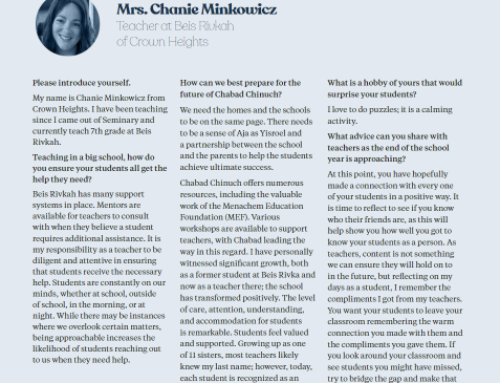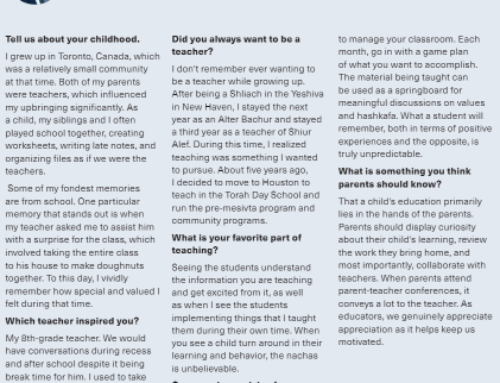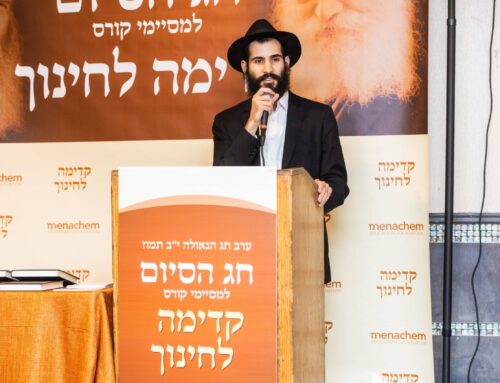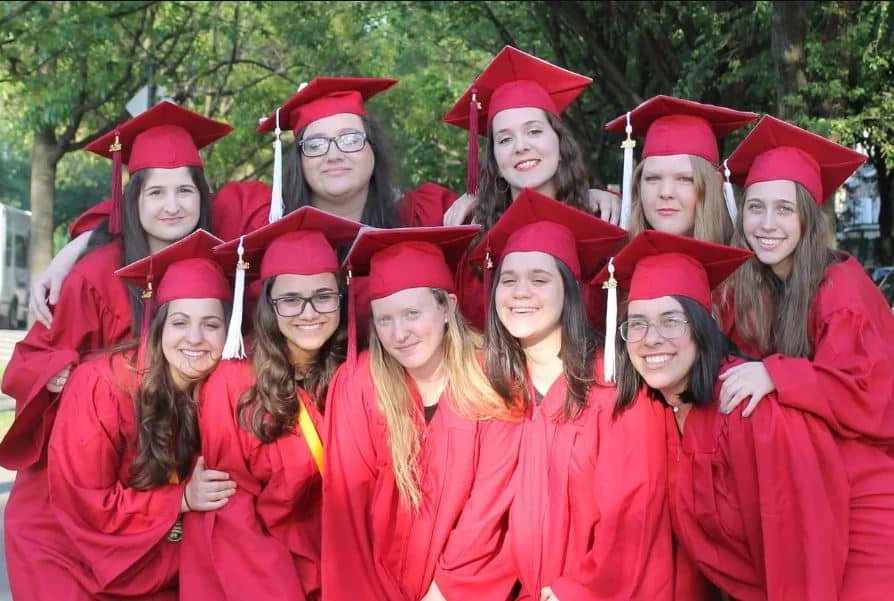
by Mrs. Dena Gorkin (as told to Chanie Gorkin)
This article has been excerpted from “Healthy, Happy, Frum: A veteran Mechaneches shares her insight into effective Chinuch”, which appeared in issue number four of the BR Embrace magazine. To view in full or subscribe to the magazine, visit www.bethrivkah.edu/embrace.
Why are you so into emotional health? How does it impact spiritual health and scholastic success?
People who know me have heard me say that, “healthy, happy, frum” is the path to being a whole chossid. The objective of raising children to serve Hashem is very difficult to reach without ensuring that the building blocks of physical and emotional health are stable.
We are living in times where the number of mental and emotional health issues has skyrocketed. You don’t have a single class in any school today that doesn’t include 20% or more of students struggling with anxiety, depression, ADHD, and other similar challenges. Another 20% are living with difficult life circumstances that get in the way of their productivity in the classroom. Would it be correct for us to say that if we’ve reached 60% of our students, our chinuch is a success? The answer is a resounding no! Our job is to reach every single student. Therefore, I believe that in this day and age, focusing on students’ emotional health is priority number one.
There are many letters from the Rebbe addressing mental health and the importance of attending to our emotional well-being. The Frierdiker Rebbe says that when a person is broken-hearted and has low self-esteem, the light of his intelligence is dimmed and his emotions are stunted. It is therefore the responsibility of every mechaneches to address the emotional needs of her students in order for learning to take place.
And when teachers cue in to the emotional needs of the students who obviously need this connection, they will provide the best possible education for all students, even the ones who seem to be emotionally more intact.
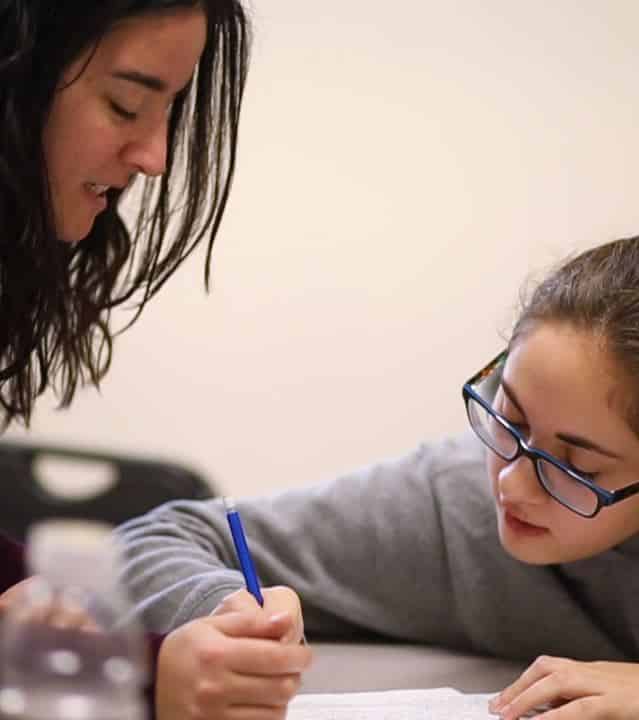
What are the optimal conditions for a child’s growth?
An environment that is structured but not rigid, empathic but not pampering or pandering, and one that celebrates success, no matter how small. Sounds simple enough, right?
It actually can be accomplished, in six steps:
- Be constantly aware that chinuch is your shlichus, and your students are your community. Treat each student as you would treat an important “Balabos” who participates in your Chabad House activities.
- Hire like-minded staff who are creative and who approach the shlichus with full ownership. (This goes for staff in administration, teaching, and guidance.)
- Constantly seek practical ways to make the school environment one of warmth and, more importantly, one of meaningful connection between staff and students. Students who feel connected to their teachers will in turn feel connected to yiddishkeit and to learning.
- Create clear rules and boundaries, with clear and consistent consequences. Of course, exceptions are always needed when dealing with human beings. In a school setting, students must be spoken to openly and honestly when exceptions are granted. A school must run on an educator’s understanding of fairness, not on a student’s understanding of fairness, and every student needs to know that fair means each person gets what she needs.
- Respect the needs and input of parents. Parenting today comes along with so many challenges, and school can alleviate some of those challenges by listening and being responsive.
- Get money!
This is a framework, but by no means an exhaustive list, of what is really involved in creating a growth-minded environment.
An environment that is structured but not rigid, empathic but not pampering or pandering, and one that celebrates success, no matter how small.
Even in such a utopian environment, how do you actually motivate children to want to grow?
Give them opportunities to succeed. If a child is good at only one thing, bombard her with opportunities to do that thing, and then celebrate the success. If a child is not particularly good at something, this does not mean she cannot succeed at it in some measure. When I taught in Bais Rivkah, I printed out a motto and gave it to each of my students on the first day of class. It said: “A mistake is a lesson; that’s why they say, ‘learn from your mistakes’.” When my students read a possuk and attempted to translate, I congratulated them even if they got one word correct. Rewarding effort motivates a child to try again and again, constantly moving closer to her goals. Of course the ultimate goal is to be able to translate the entire possuk perfectly, but she needs to understand that every time she exercises her learning muscles, she increases her capacity for learning, and through that her ability to achieve her ultimate goals.
Word has it that you’re very into כללי חינוך והדרכה- what are some insights you have gleaned from it, that have helped you in your chinuch career?
The importance of understanding the gashmius and ruchniyus background of each student is a prerequisite for teaching. How will you teach about כיבוד אב ואם in a classroom where a student’s mother recently passed away? How will you alter the homework schedule of a student who travels an hour and a half to and from school every day? How will you present the idea of מתן תורה in a classroom where you surely have students who are questioning their relationship with Torah? How will you answer a student who is addicted to her cellphone, when she asks you about cellphone usage on shabbos? The Frierdiker Rebbe urges us to know where our students are coming from, so that we can effectively guide them to where they need to go.
Another crucial point for all educators to take to heart is the importance of self-awareness and self-inspection. We must constantly be growing both personally and professionally. Having a mashpia is essential to this growth process. The Frierdiker Rebbe speaks about self-love as the ultimate hindrance to an educator’s success. Self-love desensitizes us to our own flaws, and keeps us in a state of complacency, which is the opposite of growth.

What can teachers/parents do if a teen is disenchanted or just doesn’t care?
Generally, if a teen is disenchanted, those feelings started years before they were apparent. Love of learning and love of Yiddishkeit are firmly intertwined with the love of trusted adults, whether they are parents, teachers or mentors. Children associate learning and Yiddishkeit with the adults in their lives who teach them either by example or through direct instruction. One of the most effective ways to turn a disenfranchised child back on, is to connect him/her with positive role models. Children, and teenagers as well, are prone to doing what feels good over what is right. Therefore, creating an association between what feels good and what is right, increases the chances that a child or teen will do what is right. Teachers inviting students to bake challah with them, or join them on a trip to the ohel, gives students a chance to connect a personal relationship with a mitzvah, thus endearing the mitzvah to them.
Any parting words of wisdom?
To be mechanech children today in any capacity, your #1 tool is unconditional love. The Rebbe is our greatest role model for this, as is evidenced in the way that he greeted and accepted people from all walks of life simply because they were Yidden. This by no means implies that firm guidance and discipline are out the window; the Rebbe modeled this as well, carefully crafting his words when giving a Chossid guidance in his behavior or a push to accomplish more. Without clear rules and guidelines, no child can thrive. However, discipline is effective only on a foundation of unconditional love. The two must go hand in hand in the education of the generation of Moshiach.
Mrs. Dena Gorkin is the founder and principal of Bnos Chomesh Academy, a girls’ high school in Crown Heights. She is also a sought after speaker and adviser on Chinuch issues, and directs MEF’s Mechaneches Training Program.

